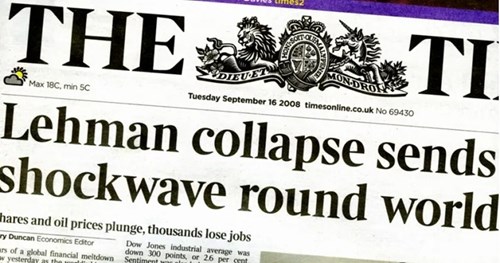
Some of our readers may remember the collapse of Long-Term Capital Management (LTCM) back in September 1998 and the impact this had on markets. For those that don’t, here is a quick summary: -
LTCM was a large hedge fund run by well-respected economists and Wall Street traders. The strategy was based on “arbitrage trading”, where managers simultaneously purchase and sell the same asset in different markets in order to profit from the tiny difference in the asset’s listed price. To magnify these returns they “leverage” or borrow so they can turn a $10 profit into $100.
LTCM's highly leveraged trading strategies failed to pan out and it suffered monumental losses. The reverberations were felt across the financial landscape and nearly collapsed the global financial system in 1998. Ultimately, the U.S. government had to step in and arrange a bailout of LTCM by a consortium of Wall Street banks in order to prevent systemic contagion.
In LTCM’s case, they were looking at the mispricing in the fixed-income markets across the world, both in traditional fixed-income instruments and derivatives.
In August 1998, Russia defaulted on its debt and LTCM was holding a significant position in Russian government bonds – despite the hundreds of millions of dollars per day being lost, the computer model guiding LTCM recommended that it held its positions. As the hedge fund lost more and more it came close to defaulting on the loans that it had taken out to “arbitrage”. When the losses approached $4 billion the federal government of the United States feared that the imminent collapse of LTCM would precipitate a larger financial crisis and orchestrated a bailout to calm the markets. A $3.65-billion loan fund was created, which enabled LTCM to survive the market volatility and liquidate in an orderly manner in early 2000.
Back then LTCM held huge positions and totalled nearly 5% of the global fixed-income market - letting this “go to the wall” would have been devastating.
Somewhat ironically, 15 years later the world witnessed the largest commercial collapse in history. The financial giant Lehman Brothers filed for bankruptcy on 15th September 2008, with $613 billion in debt, putting thousands of employees out of work and sending the already recessionary economy into a tailspin.
Whilst Lehman Brothers were not in the arbitrage space, they were heavily involved in the mortgage market. Here homebuyers with mortgages who couldn’t afford to pay their monthly repayments defaulted on their loans. This was the start of the Financial Crisis of 2008/2009 and we know how long that took us to recover from!

In fact, the house of cards that was built by Lehman’s is retold in the star-studded film “The Big Short”, featuring Steve Carell, Christian Bale, Ryan Gosling, Brad Pitt and Margot Robbie, which takes a light-hearted and informative look at what was otherwise a very dark time in markets.
Now 15 years since Lehman’s, on the whole markets have been kind, perhaps with the exception of the last three.
This year we have had two banks collapse, and whilst the government didn’t have to help out with Silicone Valley Bank, they did take measures to calm the markets to ensure there was not too much panic as the memories of 2008 came to the fore. Just days later, Credit Suisse followed suit, although this time their Suisse competitor UBS stepped in to buy the distressed assets. Whilst this did impact markets in March, six months on this has almost been forgotten and the generic financials index is in positive territory.
As investors in our discretionary funds will know, we do not tend to invest in either hedge funds or developed market banks, as the transparency on the hedge funds tends to be poor and trading tends to be high. Banks, on the other hand, are very complex beasts which we would prefer not to own.
You should rest assured that all funds that sit within our multi-manager range are subject to the mantra of being open, honest and transparent and agree to our exacting standards of what we expect before investing with them.
The good news is that we seem to have gotten through this September without any major concerns!
We hope you have a good week.

